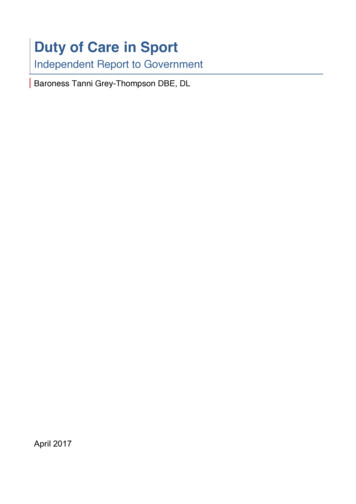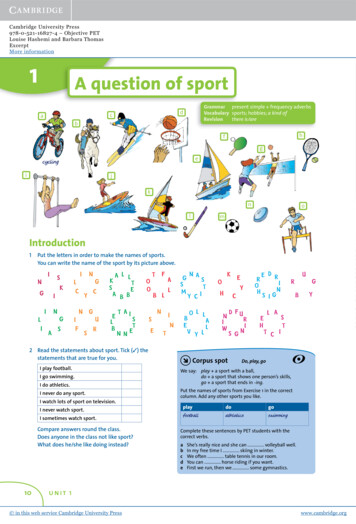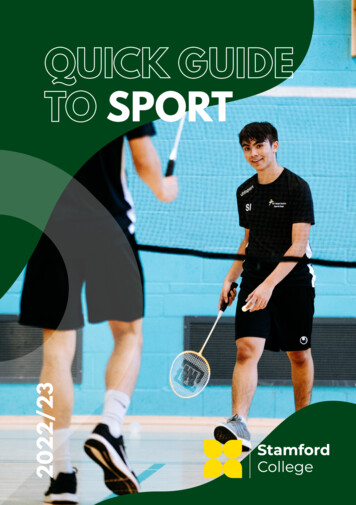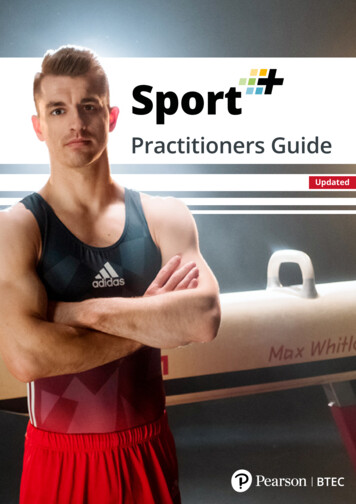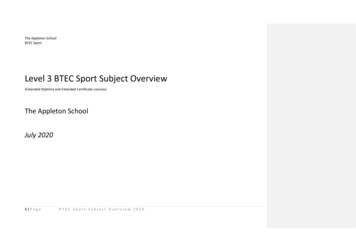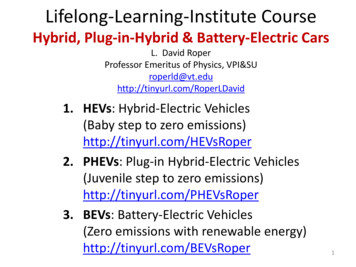
Transcription
PearsonBTEC Level 3 NationalsinSport and FitnessSpecificationExtended Certificate and FoundationDiploma in Sport and FitnessDiploma and Extended Diploma in Sport,Fitness and Personal TrainingFirst teaching from September 2019First certification from 2020Issue 5
PearsonBTEC Level 3 NationalsExtended Certificate inSport and FitnessFoundation Diploma inSport and FitnessDiploma in Sport, Fitnessand Personal TrainingExtended Diploma in Sport,Fitness and Personal TrainingSpecificationFirst teaching September 2019Issue 5
Edexcel, BTEC and LCCI qualificationsEdexcel, BTEC and LCCI qualifications are awarded by Pearson, the UK’s largest awarding bodyoffering academic and vocational qualifications that are globally recognised and benchmarked.For further information, please visit our qualifications website at qualifications.pearson.com.Alternatively, you can get in touch with us using the details on our contact us page atqualifications.pearson.com/contactusAbout PearsonPearson is the world's leading learning company, with 25,000 employees in more than 70 countriesworking to help people of all ages to make measurable progress in their lives through learning.We put the learner at the centre of everything we do, because wherever learning flourishes, so dopeople. Find out more about how we can help you and your learners at qualifications.pearson.comThis specification is Issue 5. We will inform centres of any changes to this issue. The latest issuecan be found on our website.References to third-party material made in this specification are made in good faith. We do notendorse, approve or accept responsibility for the content of materials, which may be subject tochange, or any opinions expressed therein. (Material may include textbooks, journals, magazinesand other publications and websites.)ISBN 978 1 446 96169 8All the material in this publication is copyright Pearson Education Limited 2022
WelcomeWith a track record built over 30 years of learner success, BTEC Nationals are widely recognisedby industry and higher education as the signature vocational qualification at Level 3. They provideprogression to the workplace either directly or via study at a higher level. Proof comes fromYouGov research, which shows that 62 per cent of large companies have recruited employees withBTEC qualifications. What’s more, well over 100,000 BTEC students apply to UK universities everyyear and their BTEC Nationals are accepted by over 150 UK universities and higher educationinstitutes for relevant degree programmes either on their own or in combination with A Levels.Why are BTECs so successful?BTECs embody a fundamentally learner-centred approach to the curriculum, with a flexible,unit-based structure and knowledge applied in project-based assessments. They focus on theholistic development of the practical, interpersonal and thinking skills required to be able tosucceed in employment and higher education.When creating the BTEC Nationals in this suite, we worked with many employers, higher educationproviders and colleges to ensure that their needs are met. Employers are looking for recruits witha thorough grounding in the latest industry requirements and work-ready skills such as teamwork.Higher education needs students who have experience of research, extended writing and meetingdeadlines.We have addressed these requirements with: a range of BTEC sizes, each with a clear purpose, so there is something to suit eachlearner’s choice of study programme and progression plans refreshed content that is closely aligned with employers’ and higher education needs for askilled future workforce assessments and projects chosen to help learners progress to the next stage. This meanssome are set by you to meet local needs, while others are set and marked by Pearsonso that there is a core of skills and understanding that is common to all learners.For example, a written test can be used to check that learners are confident in usingtechnical knowledge to carry out a certain job.We provide a wealth of support, both resources and people, to ensure that learners and theirteachers have the best possible experience during their course. See Section 10 for details of thesupport we offer.A word to learnersToday’s BTEC Nationals are demanding, as you would expect of the most respected applied learningqualification in the UK. You will have to choose and complete a range of units, be organised, takesome assessments that we will set and mark and keep a portfolio of your assignments. But you canfeel proud to achieve a BTEC because, whatever your plans in life – whether you decide to studyfurther, go on to work or an Apprenticeship, or set up your own business – your BTEC National willbe your passport to success in the next stage of your life.Good luck, and we hope you enjoy your course.
Collaborative developmentLearners completing their BTEC National qualifications in the sport, fitness and personal trainingsector will aim to go on to employment, often via the stepping stone of higher education.Therefore, it was essential that we developed these qualifications in close collaboration with expertsfrom professional bodies, businesses and universities, and with the providers who will be deliveringthe qualifications. To ensure that the content meets providers’ needs and provides high-qualitypreparation for progression, we engaged experts and mapped these qualifications to industrystandards. We are grateful to all the university and further education lecturers, teachers,employers, professional body representatives and other individuals who have generously sharedtheir time and expertise to help us develop these new qualifications.Employers, partners and professional bodies and higher education providers that have worked withus include: The Chartered Institute for the Management of Sport and Physical Activity (CIMSPA) The Register of Exercise Professionals (REPs) The UK Anti-Doping (UKAD).In addition, universities, professional bodies and businesses have provided letters of supportconfirming that these qualifications meet their entry requirements. These letters can be viewed onour website.
Summary of Pearson BTEC Level 3 Nationals in Sport, Fitness andPersonal Training specification Issue 5 changesSummary of changes made between the previous issue and thiscurrent issuePagenumberSentence and website link added to the Introduction to BTEC Nationalqualifications for the sport, fitness and personal training sector section pointinglearners to the guide to industry standards if they need more information onapplying for a job in the sport and active leisure industry.Page 1A rule has been added to state that Unit C2: Fitness Skills Development must betaken before Unit D2: Personal Trainer Skills Development.Pages 4, 16,17 and 49A bullet point was added under subsection Internally-assessed units to drawattention to Appendix 1 for additional suggestions and support.Page 5Under subsection Language of assessment reference has been added to theavailability of these qualifications in Welsh.Page 6In section 1 Qualification purpose subsections What could this qualification leadto? for each qualification have been reworded to clarify that the qualificationsattract UCAS Tariff points.Pages 9, 10,11 and 13In Unit D2: Personal Trainer Skills Development the Essential information forassessment decisions section under Learning aim D for pass standard has beenamended to specify that the session needs to include a minimum of twoapproaches to training. A sentence has been added to notify that an exampleObservation Record has been created and is available within ‘course materials’on the qualification website.Page 90In Unit E: Research Project in Sport (Pearson-set) the Essential information forassignments section has been reworded for clarity.Page 97Changes made to Unit 4: Nutrition for Physical Performance wording in sectionsUnit introduction, Content for areas C1, C2, Assessment criteria for C.M3,Essential information for assessment decisions section for Learning aims A,B and C under merit standard for clarity.Pages 111,115, 116, 118and 120Changes made to Unit 9: Fitness Training wording in the Assessment criteriasection for A.D1, B.P3, B.P4, B.D2, C.D3, Essential information for assignments toreflect the Assessment criteria table changes, Essential information for assessmentdecisions section for Learning aims A and B distinction standard.Pages 161163Changes made to Unit 15: Ethical and Current Issues in Sport wording in Contentsection under A2 for clarity.Page 179In section 10 Resources and support subsections Schemes of work and Study skillsactivities have been removed and a link to the Learning Hub has been added.Page 262If you need further information on these changes or what they mean, contact us via our website s.html.
ContentsIntroduction to BTEC National qualifications for the sport, fitness andpersonal training sector1Total Qualification Time2Qualifications, sizes and purposes at a glance3Structures of the qualifications at a glance4Qualification and unit content5Assessment5Grading for units and qualifications7UCAS Tariff points71 Qualification purpose82 Structure143 Units19Understanding your units19Index of units214 Planning your programme2355 Assessment structure239Introduction6 Internal assessment239240Principles of internal assessment240Setting effective assignments242Making valid assessment decisions244Planning and record keeping2467 Administrative arrangements247Introduction247Learner registration and entry247Access to assessment247Administrative arrangements for internal assessment247Dealing with malpractice in assessment248Certification and results249Additional documents to support centre administration2508 Quality assurance2519 Understanding the qualification grade25210 Resources and support262Support for setting up your course and preparing to teach262Support for teaching and learning262Support for assessment262Training and support from Pearson264Appendix 1 Glossary of terms used for internally-assessed units265
Introduction to BTEC National qualificationsfor the sport, fitness and personal trainingsectorThis specification contains the information you need to deliver the Pearson BTEC Level 3 Nationalqualifications in the sport, fitness and personal training sector. The specification signposts you toadditional handbooks and policies. It includes all the units for these qualifications.These qualifications are part of the suite of sport, fitness and personal training qualifications offeredby Pearson. In the suite, there are qualifications that focus on different progression routes, allowinglearners to choose the one best suited to their aspirations.There are new staffing requirements for the teacher, Assessor and Internal Verifier for Unit C2:Fitness Skills Development and Unit D2: Personal Trainer Skills Development. Please refer toSection 4 Planning your programme for further information.All qualifications in the suite share some common units and assessments, giving learners someflexibility in moving between sizes. The qualification titles are given below.There are BTEC National qualifications in this suite for post-16 learners who want to specialise ina specific industry, occupation or occupational group. The qualifications give learners specialistknowledge and technical skills, enabling entry to an Apprenticeship or other employment, orprogression to related higher-education courses. Learners taking these qualifications should have asignificant level of employer involvement in their programmes.In the sport, fitness and personal training sector, these qualifications are: Pearson BTEC Level 3 National Extended Certificate in Sport and Fitness (603/4925/6)Pearson BTEC Level 3 National Foundation Diploma in Sport and Fitness (603/4927/X)Pearson BTEC Level 3 National Diploma in Sport, Fitness and Personal Training (603/4928/1)Pearson BTEC Level 3 National Extended Diploma in Sport, Fitness and Personal Training(603/4929/3).The Extended Certificate (360 GLH) and Foundation Diploma in Sport and Fitness (540 GLH), andthe Diploma (720 GLH) and Extended Diploma in Sport, Fitness and Personal Training (1080 GLH)qualifications are not currently recognised for performance measures and are primarily intended forprogression to employment.Other BTEC National qualifications in this sector provide a broad introduction that gives learnerstransferable knowledge and skills. These qualifications are for post-16 learners who want tocontinue their education through applied learning. The qualifications prepare learners for a rangeof higher-education courses by meeting entry requirements or through being accepted alongsideother qualifications at the same level and adding value to them. Achieving this qualificationwill give you an advantage when applying for a job in the sport and active leisure industry.For more information access the guide to industry t/dam/pdf/BTEC-Nationals/Sport/BTECSport CIMSPA.pdfLearners may progress to one of the qualifications in this specification having completed a smallerqualification that provides suitable fundamental knowledge and skills.In the sport, fitness and personal training sector, these qualifications are: Pearson BTEC Level 3 National Certificate in Sport (603/0458/3)Pearson BTEC Level 3 National Extended Certificate in Sport (601/7218/6)Pearson BTEC Level 3 National Foundation Diploma in Sport (601/7220/4)Pearson BTEC Level 3 National Diploma in Sport (603/0460/1)Pearson BTEC Level 3 National Extended Diploma in Sport (603/0459/5).This specification signposts all the other essential documents and support that you need as a centrein order to deliver, assess and administer the qualification, including the staff developmentrequired. A summary of all essential documents is given in Section 7 Administrative arrangements.Information on how we can support you with this qualification is given in Section 10Resources and support.The information in this specification is correct at the time of publication.Pearson BTEC Level 3 Nationals in Sport, Fitness and Personal Training –Specification – Issue 5 – January 2022 Pearson Education Limited 20221
Total Qualification TimeFor all regulated qualifications, Pearson specifies a total number of hours that it is estimatedlearners will require to complete and show achievement for the qualification: this is the TotalQualification Time (TQT). Within TQT, Pearson identifies the number of Guided Learning Hours(GLH) that we estimate a centre delivering the qualification might provide. Guided learning meansactivities, such as lessons, tutorials, online instruction, supervised study and giving feedback onperformance, that directly involve teachers and assessors in teaching, supervising and invigilatinglearners. Guided learning includes the time required for learners to complete external assessmentunder examination or supervised conditions.In addition to guided learning, other required learning directed by teachers or assessors willinclude private study, preparation for assessment and undertaking assessment when not undersupervision, such as preparatory reading, revision and independent research.BTEC Nationals have been designed around the number of hours of guided learning expected.Each unit in these qualifications has a GLH value of 60, 90, 120 or 180. There is then a totalGLH value for the qualification.Each qualification has a TQT value. This may vary in sectors and across the suite, dependingon the nature of the units in each qualification and the expected time for other required learning.The following table shows all the qualifications in this sector and their GLH and TQT values.2Pearson BTEC Level 3 Nationals in Sport, Fitness and Personal Training –Specification – Issue 5 – January 2022 Pearson Education Limited 2022
Qualifications, sizes and purposes at a glanceTitleSize and structureSummary purposePearson BTEC Level 3National ExtendedCertificate in Sport andFitness*360 GLH (480 TQT)This is intended for post-16 learnerswho want to progress directly toemployment in the health and fitnesssector as a gym instructor. Whenstudied alongside other Level 3qualifications as part of the studyprogramme, it also supportsprogression to a wide rangeof higher-education courses.Pearson BTEC Level 3National FoundationDiploma in Sport andFitness*540 GLH (720 TQT)Pearson BTEC Level 3National Diploma inSport, Fitness andPersonal Training*720 GLH (950 TQT)Pearson BTEC Level 3National ExtendedDiploma in Sport,Fitness and PersonalTraining*1080 GLH (1,365 TQT)Equivalent in size to oneA Level.Three units, all of which aremandatory.Mandatory content (100%).Equivalent in size to 1.5A Levels.Six units, four of which aremandatory.Mandatory content (78%).Equivalent in size to twoA Levels.Seven units, all of which aremandatory.Mandatory content (100%).Equivalent in size to threeA Levels.12 units of which eight aremandatory.Mandatory content (78%).This is intended for post-16 learnerswho want to progress directly toself-employment in the health andfitness sector as a gym instructor.When studied alongside other Level 3qualifications as part of the studyprogramme, it also supportsprogression to a range ofhigher-education courses.This is intended for post-16 learnerswho want to progress directly intoemployment in the health and fitnesssector as a personal trainer. Whenstudied alongside another Level 3qualification as part of the studyprogramme, it supports progression tohigher education programmes relatedto sport and fitness.This is intended for post-16 learnerswho want to progress directly to selfemployment in the health and fitnesssector as a personal trainer.Additionally, the breadth of optionalcontent in the qualification allowslearners to widen their opportunitiesto progress to a number of differenthigher-education courses.*These qualifications are not eligible for performance tables in England.Pearson BTEC Level 3 Nationals in Sport, Fitness and Personal Training –Specification – Issue 5 – January 2022 Pearson Education Limited 20223
Structures of the qualifications at a glanceThis table shows all the units and the qualifications to which they contribute. The full structures for these Pearson BTEC Level 3 National qualificationsin the sport, fitness and personal training sector are shown in Section 2 Structure. You must refer to the full structure for the relevantqualification to select units and plan your programme.KeyMMandatory unitsOUnit (number and title)Optional unitsUnitsize(GLH)ExtendedCertificate inSport and FitnessFoundationDiploma in Sportand FitnessDiploma in Sport,Fitness andPersonal Training(360 GLH)(540 GLH)(720 GLH)Extended Diplomain Sport, Fitnessand PersonalTraining(1080 GLH)A Careers in the Sport and Active Leisure Industry90MMMMB Health, Wellbeing and Sport90MMMMC2 Fitness Skills Development**180MMMMD2 Personal Trainer Skills Development180MMEResearch Project in Sport (Pearson-set)*1202Self-employment in Sport and Physical Activity60MMM4Nutrition for Physical Performance60OMM6Sporting Injuries60O7Functional Sports Massage60O8Fitness Testing60OO9Fitness Training60OO14 Organising Events in Sport and Physical Activities60OO15 Ethical and Current Issues in Sport60O16 Marketing Communications60O17 Corporate Social Responsibility in Sport60O18 Sport and Leisure Facility Operations60O19 Sports Tourism60O21 Business and Technology in Personal Training60MOMM* Unit E: Research Project in Sport can only be taken in the second year. ** Unit C2 must be taken before Unit D2. Units A, B, 2, 4, C2, D2 and E canbe complemented by the Sport 2019 Learning Hub https://www.pearson.com/uk/web/learning-hub.html Digital solution.4Pearson BTEC Level 3 Nationals in Sport, Fitness and Personal Training –Specification – Issue 5 – January 2022 Pearson Education Limited 2022
Qualification and unit contentPearson has developed the content of the new BTEC Nationals in collaboration with employers andrepresentatives from higher education and relevant professional bodies. In this way, we haveensured that content is up to date and that it includes the knowledge, understanding, skills andattributes required in the sector.Each qualification in the suite has its own purpose. The mandatory and optional content providesa balance of breadth and depth, while retaining a degree of choice for individual learners to studycontent relevant to their own interests and progression choices. Also, the content may be appliedduring delivery in a way that is relevant to local employment needs.The proportion of mandatory content ensures that all learners are following a coherent programmeof study and acquiring the knowledge, understanding and skills that will be recognised and valued.Learners are expected to show achievement across mandatory units as detailed in Section 2.BTEC Nationals have always required applied learning that brings together knowledge andunderstanding (the cognitive domain) with practical and technical skills (the psychomotor domain).This is achieved through learners performing vocational tasks that encourage the development ofappropriate vocational behaviours (the affective domain) and transferable skills. Transferable skillsare those such as communication, teamwork, research and analysis, planning and completing tasksto high standards, which are valued in both the workplace and in higher education.Our approach provides rigour and balance, and promotes the ability to apply learning immediatelyin new contexts. Further details can be found in Section 2.Centres should ensure that delivery of content is kept up to date. Some of the units withinthe specification may contain references to legislation, policies, regulations and organisations,which may not be applicable in the country you deliver this qualification in (if teaching outside ofEngland), or which may have gone out-of-date during the lifespan of the specification. In theseinstances, it is possible to substitute such references with ones that are current and applicablein the country you deliver subject to confirmation by your Standards Verifier.AssessmentAssessment is specifically designed to fit the purpose and objective of the qualifications. It includesa range of assessment types and styles suited to vocational qualifications in the sector. For thesequalifications, there are two main forms of assessment that you need to be aware of: internal andsynoptic.Internally-assessed unitsMost units in the sector are internally assessed and subject to external standards verification.In these qualifications in sport, fitness and personal training, all units are internally assessed.This means that you set and assess the assignments that provide the final summative assessmentof each unit, using the examples and support that Pearson provides. Before you assess you willneed to become an approved centre, if you are not one already. You will need to prepare to assessusing the guidance in Section 6.In line with the requirements and guidance for internal assessment, you select the mostappropriate assessment styles according to the learning set out in the unit. This ensures thatlearners are assessed using a variety of styles to help them develop a broad range of transferableskills. Learners could be given opportunities to: write up the findings of their own researchuse case studies to explore complex or unfamiliar situationscarry out projects for which they have choice over the direction and outcomesdemonstrate practical and technical skills using appropriate processesreview Appendix 1 for additional suggestions and support.You should also be aware of the specific assessment requirements for Unit E: Research Project inSport (Pearson-set). More information is given in the Pearson-set Theme and Topic Release andPearson-set Assignment Guidance documents, both available on our website.Pearson BTEC Level 3 Nationals in Sport, Fitness and Personal Training –Specification – Issue 5 – January 2022 Pearson Education Limited 20225
You will make grading decisions based on the requirements and supporting guidance given inthe units. Learners may not make repeated submissions of assignment evidence. For furtherinformation see Section 6.Synoptic assessmentSynoptic assessment requires learners to demonstrate that they can identify and use effectively,in an integrated way, an appropriate selection of skills, techniques, concepts, theories andknowledge from across the whole sector as relevant to a key task. BTEC learning has alwaysencouraged learners to apply their learning in realistic contexts using scenarios and realisticactivities that will permit learners to draw on and apply their learning. For these qualificationswe have identified unit(s) that contain a synoptic assessment task. Synoptic assessment shouldtake place after the teaching and learning of other mandatory units in order for learners to be ableto draw from the full range of content. The synoptic assessment gives learners an opportunity toindependently select and apply learning from across their programmes in the completion of avocational task. The particular unit that contains the synoptic tasks for this qualification is shownin the structure in Section 2.Externally-assessed unitsThere are no externally-assessed units in this qualification. All units are internally assessed.Language of assessmentAssessment of the internal and external units for these qualifications will be available in English andWelsh. All learner work must be in English and or Welsh. Learners taking the qualifications may beassessed in British or Irish Sign Language where it is permitted for the purpose of reasonableadjustment. For information on reasonable adjustments, see Section 7 Administrativearrangements.6Pearson BTEC Level 3 Nationals in Sport, Fitness and Personal Training –Specification – Issue 5 – January 2022 Pearson Education Limited 2022
Grading for units and qualificationsAchievement in the qualification requires a demonstration of depth of study in each unit, assuredacquisition of a range of practical skills required for employment or progression to higher education,and successful development of transferable skills. Learners achieving a qualification will haveachieved across mandatory units, including external and synoptic assessment.Internally-assessed units are assessed using a grading scale of Distinction (D), Merit (M), Pass (P),and Unclassified (U). All mandatory and optional units contribute proportionately to the overallqualification grade, for example a unit of 120 GLH will contribute double that of a 60 GLH unit.Qualifications in the suite are graded using a scale of P to D*, or PP to D*D*, or PPP to D*D*D*.Please see Section 9 for more details. The relationship between qualification grading scales and unitgrades will be subject to regular review as part of Pearson’s standards monitoring processes on thebasis of learner performance and in consultation with key users of the qualification.UCAS Tariff pointsThe BTEC Nationals attract UCAS points. Please go to the UCAS website for full details of thepoints allocated.Pearson BTEC Level 3 Nationals in Sport, Fitness and Personal Training –Specification – Issue 5 – January 2022 Pearson Education Limited 20227
1 Qualification purposePearson BTEC Level 3 National qualifications in the sport, fitness andpersonal training sectorThe health and fitness industry is continuing to grow, with over 7000 gyms in the UK and morethan 10 million members, which means almost one in seven people in the UK is a member of a gym(State of the UK Fitness Industry Report, The Leisure Database, May 2019). This gives the industrya market value of more than 5 billion, meaning that there are many employment opportunities forpeople with industry-recognised health and fitness related qualifications.This suite of qualifications has embedded industry accreditation, which allows learners to progressdirectly to work in the sector or to further study.In this section, you will find information on the purpose of this qualification suite and how its designmeets that purpose through the objective and structure of each qualification. We publish a full‘Statement of Purpose’ for each qualification on our website. These statements are designed toguide you and potential learners to choose the most appropriate size of qualification suitable atrecruitment.Pearson BTEC Level 3 National Extended Certificate in Sport and FitnessThe Pearson BTEC Level 3 National Extended Certificate in Sport and Fitness, which is 360 GLH andequivalent in size to one A Level. It may be taken alongside other Level 3 vocational qualificationsand/or A Levels as part of a two-year, full-time study programme. For example, it could be takenalongside the Pearson BTEC Level 3 National Diploma in Travel and Tourism or the Pearson BTECLevel 3 National Diploma in Business, broadening learners’ potential career options.Who is this qualification for?The Pearson BTEC Level 3 National Extended Certificate in Sport and Fitness is intended for post-16learners who want to progress directly to employment in the health and fitness sector. It is alsosuitable for those wishing to progress to higher education, where they may use this qualificationto obtain part-time employment while studying.What does this qualification cover?The content of this qualification has been developed in consultation with employers andprofessional bodies. This ensures that it is appropriate and consistent with current industry practiceto enable learners to enter direct employment in the health and fitness sector. Higher-educationinstitutions have also been consulted to ensure that the qualification allows appropriate progressionfor those aspiring to go on to higher-level study.The qualification provides the knowledge and develops the skills and application required forprofessional ac
Fitness and Personal Training First teaching from September 2019 First certification from 2020 Issue 5. . change, or any opinions expressed therein. (Material may include textbooks, journals, magazines and other publications and websites.) ISBN 978 1 446 96169 8 . Personal Trainer Skills

